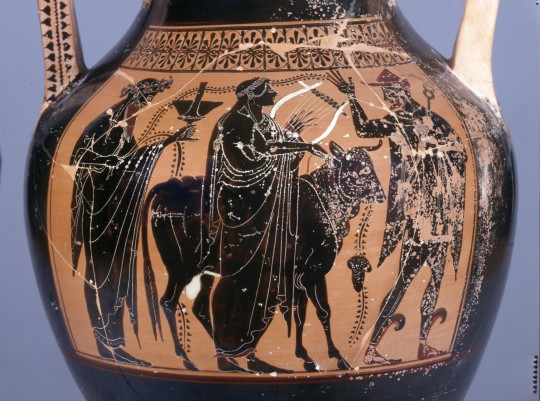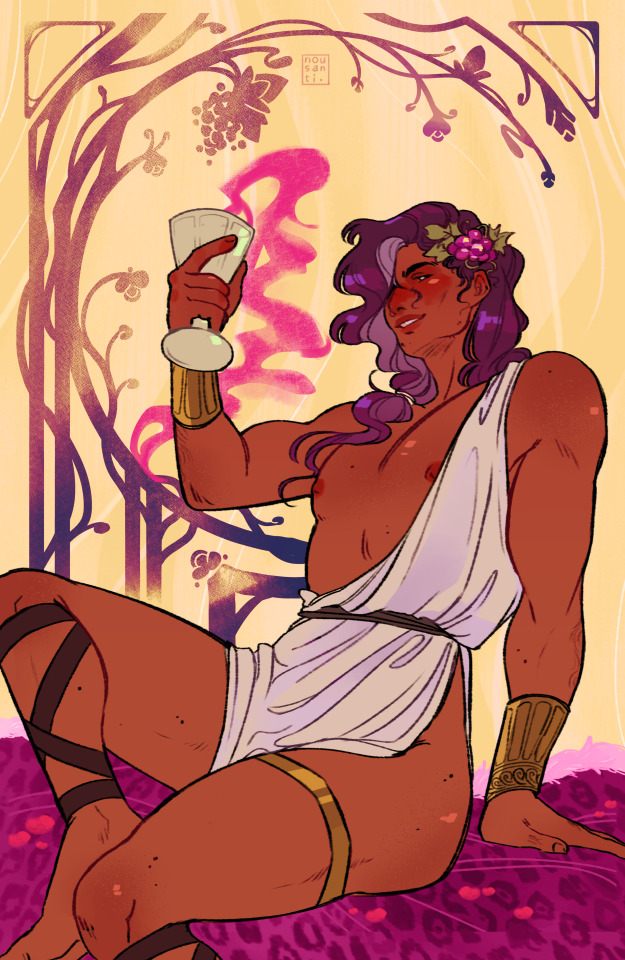Text

Apollo entertaining Dionysus and Hermes
Black figure Amphora (520BC-510BC) attributed to the Rycroft Painter.
91 notes
·
View notes
Text

dancing under the moon… howling ancient chants … and burning wild flowers with the beautiful feminine devotees of mad old gods… could be the move
This drawing ended up having some cool Dionysus vibes and I’m not complaining.
(thrashkink_art on instagram 😊)
91 notes
·
View notes
Text


~ Ariadne and Dionysus.
Period: Late Roman/Late Antiquity
Date: A.D. 3rd-5th century
Place of origin: Achmim, Egypt
Medium: Wool on linen, colored knitting
849 notes
·
View notes
Text
“The first love of Dionysus (the Latin Bacchus), according to a myth from the fifth century C.E., was a boy named Ampelus. The two wrestled, swam, and hunted together. Ampelus befriended animals, and one day encountering a bull, he mounted it, only to be thrown from it, gored, and killed. The god was heartbroken and shed his first tears, and was comforted only on learning that the beloved body would turn into the vine. This metamorphic consequence of male-male love both gave the world wine and enabled Dionysus to fulfill his destiny to be its god.”
— [x] (via flyingcorpseinthesky)
494 notes
·
View notes
Text
I bring a bacchic revelry sort of vibe to thebes that pentheus doesn't really like
997 notes
·
View notes
Text

“We hope you’re enjoying the party…”
258 notes
·
View notes
Photo

Cheers king! 🍇✨
4K notes
·
View notes
Text
Dionysus isn't a meme
every time i look through the "Dionysus" tag, all i get is percy jackson, the hades game, cute fanart of him and'/or ariadne, or funny haha memes. so few people seem to understand that Dionysus is not just some silly little androgynous fella who loves wine and his wife. He's a god of contradictions, being both one of the oldest and youngest gods worshipped for thousands of years. He's a liberator, not only of the mental cage and burdens of society, but literally, he would travel around and free people who were being treated unfairly.
I've read that archaeologists still sometimes can't tell if art is of Jesus or Dionysus. Dionysus gave us theatre, a way to tell stories on a much grander scale to a much wider audience. He sees no gender or sexuality, for he is of them all, and he calls and accepts everyone who desires to be free.
Sure, yes, he can be silly, he can be flamboyant, and he'll do anything for his loved ones, but he's not just a goofy guy for people to use in joke text memes. this is my patron god. he's been with me my whole life. part of my life is devoted to theatre, my greatest passion, because of him. i feel comfortable with my mental illnesses and femininity because of him. yes, i may call him my dude and think of him as my fun, goofy uncle or whatever, but he seriously means a lot to me. practically every aspect of my life has been touched by him. he frees me from my doubts and insecurities. he encourages me to pursue life's delights in spite of my struggles. he gives me HOPE.
the whole reason i named this blog after Dionysus is because i've always held him in my heart, and he has always been here for me. please don't just water him down to a funny guy who drinks wine.
444 notes
·
View notes
Text

Dionysus and the pirates turned dolphins.
72 notes
·
View notes
Text

Dionysus and Ariadne
116 notes
·
View notes
Text
things i am desperately in need of:
1. life-sized statues of my Gods that i can run to and wrap my arms around when i feel Emotions
2. see number 1
27 notes
·
View notes
Text

I think this is a cool addition
thinking about how, yes Dionysus is himself the wine we drink and use for libations, but it is also his love Ampelos - and how Dionysus sharing wine with humanity is also, in a way, sharing his love of Ampelos with everyone.
and by sharing his love in the form of the grape-vine he has made him immortal.
69 notes
·
View notes
Text
just a reminder this is a religious blog and that I am a polytheist
sometimes I make jokes or share memes, but I take my relationship with the Gods seriously
thanks 🌟
12 notes
·
View notes
Text


Happy Trans Day of Visibility— I wanted to celebrate by putting these two together in one post!
I’m a proud trans artist and I love celebrating trans people in my art!
5K notes
·
View notes
Text
thinking about how, yes Dionysus is himself the wine we drink and use for libations, but it is also his love Ampelos - and how Dionysus sharing wine with humanity is also, in a way, sharing his love of Ampelos with everyone.
and by sharing his love in the form of the grape-vine he has made him immortal.
69 notes
·
View notes
Text
Obscure Gods: Misa/Mise/Mises
It isn’t hard to find information on Iakkhos, considering His identification with the ever-popular Dionysos, but try finding information on Misa, the feminine portion of the God Iakkhos.
The Orphic Hymns give us the following hymn to Mises:
The fumigation of storax.
Call Thesmophorus, spermatic God [Dionysos], of various names, who bears the leafy rod:
Mises [Misa], ineffable, pure, sacred queen, two-fold Iacchus, male and female seen:
Illustr’ous, whether to rejoice is thine in incense offer’d, in the fane divine;
Or if in Phrygia most thy soul delights, performing with thy mother sacred rites;
Or if the land of Cyprus is thy care, well pleas’d to dwell with Cytheria fair;
Or if exulting in the fertile plains with thy dark mother Isis, where she reigns,
With nurses pure attended, near the flood of sacred Egypt, thy divine abode:
Wherever resident, blest pow’r attend, and with benignant mind these labours end.
- Orphic Hymn XLI, trans. Thomas Taylor
This is the Goddess who is the femininity of Dionysos. She is described as a maiden, called Kore. Asklepiades of Tragilos says she’s a daughter of Dysaules and Baubo. In the 19th century, scholars wondered if Misa was not Cybele or Persephone under an Orphic gloss. She is also understood to be one of the attendants of Demeter.
As a deity of the Orphics, Misa is sometimes understood as both male and female. Understood as both stable and generative. In spite of Her androgyny, Mise is repeatedly referred to by feminine terms. She is hardly alone in this trait. There is bearded Aphrodite, and Hermaphrodite, as well as many others.

Some think that Misa originated as a local deity, who became adopted by the mystes of Orpheus.
With Her connection with Cybele, it is possible that her origin lay in Phrygia.
Normally, I would here talk about Her cult, but the truth is that the Orphics were varied and are not a singular practice, but are rather a multiplicity that vary, centered around Dionysos and of the Two Goddesses, Demeter and Kore. Speculations are rampant. This is all made more difficult by the fact that Orphism overlapped with other groups of the day, including the Pythagoreans. Additionally, the Mystery cults held their secrets close, and so little survives that some, such as Martin West, believe that Orphism was little more than dabbling.
Orphics took food restrictions and taboos on activities that other Hellenes accepted readily. There was an emphasis on purity, much like many cults of the era. We know that incense and libations were offered, and that in Misa’s case, storax was a useful offering. More is difficult to say, though many have produced speculation and fantasy over the ages.
So we know that Mises is a Goddess with characteristics of two genders, that she is a Queen, and a powerful one at that. We know she has the quality of purity, but not much about what that really means. In light of Her possible conflation with Cybele, it seems she is a Great Mother type of deity. And we know that She receives offerings of Storax. I find myself wondering if her androgyny has not made some scholars reluctant to dig into her origins and history in more depth. Perhaps, perhaps not. It may be, that there simply is nothing that survives.
Sources:
Theoi.com
Athanassakis, Apostolos and Benjamin Wolkow. The Orphic Hymns, Johns Hopkins, 2013.
Dowden, Ken and Niall Livingstone, eds. A Companion to Greek Mythology. Wiley, 2011.
Edmonds, III, Radcliffe G. Redefining Ancient Orphism: A Study in Greek Religion, Cambridge, 2013.
Faber, G-S. A dissertation on the mysteries of the Cabiri; or the great gods of Phenicia, Samothrace, Egypt, Troas, Grece, Italy and Crete (etc.), Rivington, 1803.
Guthrie, W. K. C. Orpheus and Greek Religion. Princeton, 1935.
Harrison, Jane Ellen. Prolegomena to the study of Greek religion, University Press, 1908.
Herrero de Jauregui, Miguel. Orphism and Christianity in Late Antiquity, de Gruyter, 2010.
Lindsay, Jack. The Ancient World: Manners and Morals, Putnam, 1968.
Nelson, Marie C. and Jean Ikenberry. Psychosexual Imperatives: their role in identity formation, Human Sciences, 1979.
West, Martin. The Orphic Poems, Clarendon, 1983.
Image:
Koryakov Yuri, “Number of Genders in the Languages of the World: 256 Languages sample.” Map, in public domain, via wikicommons: https://commons.wikimedia.org/wiki/File:Number_genders.png
56 notes
·
View notes
